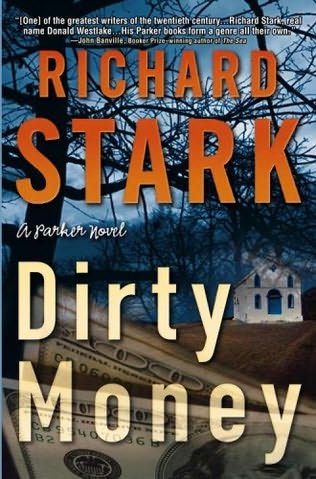 I’ve praised Donald Westlake many times on this blog and elsewhere, so it will come as no surprise that the news of his unexpected death, which reached me in Florida via Sarah, hit me hard.
I’ve praised Donald Westlake many times on this blog and elsewhere, so it will come as no surprise that the news of his unexpected death, which reached me in Florida via Sarah, hit me hard.
Westlake was one of America’s great literary entertainers, both under his own name and as “Richard Stark,” the pseudonym that he used when writing about Parker, the quintessential noir anti-hero. As I wrote last May in praise of the Parker novels:
Anyone who doubts the existence of original sin, or something very much like it, would do well to reflect on the enduring popularity of the novels of Richard Stark. For forty-six years now, Stark has been writing terse, hard-nosed books about a cold-hearted burglar named Parker (nobody seems to know his first name) who steals for a living, usually gets away with it, and stops at nothing, including murder, in order to do so. I couldn’t begin to count the number of people Parker has killed in the course of the twenty-four books in which he figures. His only virtues are his intelligence and his professionalism–yet you end up rooting for him whenever you read about him. Nietzsche knew why: when you look into an abyss, the abyss looks into you….
It’s a permanent puzzlement that Westlake, who is best known for his charming comic crime novels, should also have dreamed up so comprehensively unfunny a character as Parker, which doubtless tells us something of interest about human dualism, the subject matter of all film noir and noir-style fiction. I wouldn’t care to speculate about what it is in Westlake’s psyche that makes him so good at writing about Parker, much less what it is that makes me like the Parker novels so much. Suffice it to say that Stark/Westlake is the cleanest of all noir novelists, a styleless stylist who gets to the point with stupendous economy, hustling you down the path of plot so briskly that you have to read his books a second time to appreciate the elegance and sober wit with which they are written.
The University of Chicago Press recently embarked on a uniform edition of the Parker novels. Westlake wrote many other good things–above all the long series of wonderfully funny novels about John Dortmunder, Parker’s comic alter ego, that he published under his own name–but I expect that it is Parker for which he will be best remembered, and rightly so.
The New York Times obituary is here.
UPDATE: Go here to read a lengthy and informed tribute by Ethan Iverson of the Bad Plus, who got to know Westlake toward the end of his life.

 “The Seafarer” was seen on Broadway last season in a production that was staged in exemplary fashion by the author himself. On that occasion I described it as “worthy of comparison with the finest work of the young Brian Friel.” For an Irish playwright, that’s a 150-proof compliment. But first impressions can be deceptive, so when Chicago’s Steppenwolf Theater Company announced that it was mounting a new production, I changed my holiday travel schedule so that I could catch a performance in between flights, then drove through a snowstorm to find out whether “The Seafarer” was as good as I’d thought. Neither play nor production disappointed me. Anyone who’s seen Tracy Letts’ “August: Osage County” on Broadway knows what Steppenwolf can do, and they’ve done it again with “The Seafarer.” Randall Arney’s staging is decidedly different in tone from the Broadway production–among other things, he’s soft-pedaled the broad physical comedy that was a highlight of Mr. McPherson’s version–but equally effective in its quieter, less overtly Irish way….
“The Seafarer” was seen on Broadway last season in a production that was staged in exemplary fashion by the author himself. On that occasion I described it as “worthy of comparison with the finest work of the young Brian Friel.” For an Irish playwright, that’s a 150-proof compliment. But first impressions can be deceptive, so when Chicago’s Steppenwolf Theater Company announced that it was mounting a new production, I changed my holiday travel schedule so that I could catch a performance in between flights, then drove through a snowstorm to find out whether “The Seafarer” was as good as I’d thought. Neither play nor production disappointed me. Anyone who’s seen Tracy Letts’ “August: Osage County” on Broadway knows what Steppenwolf can do, and they’ve done it again with “The Seafarer.” Randall Arney’s staging is decidedly different in tone from the Broadway production–among other things, he’s soft-pedaled the broad physical comedy that was a highlight of Mr. McPherson’s version–but equally effective in its quieter, less overtly Irish way…. A colossal brouhaha has been stirred up by Gilbert Kaplan, who led the New York Philharmonic in a performance of Mahler’s Second Symphony last month. Kaplan, as Mahler-loving music buffs know, is a rich businessman with the sketchiest of musical training who fell in love with the Mahler Second, decided in middle age to become a conductor solely in order to perform that one piece, and has now conducted it all over the world and
A colossal brouhaha has been stirred up by Gilbert Kaplan, who led the New York Philharmonic in a performance of Mahler’s Second Symphony last month. Kaplan, as Mahler-loving music buffs know, is a rich businessman with the sketchiest of musical training who fell in love with the Mahler Second, decided in middle age to become a conductor solely in order to perform that one piece, and has now conducted it all over the world and